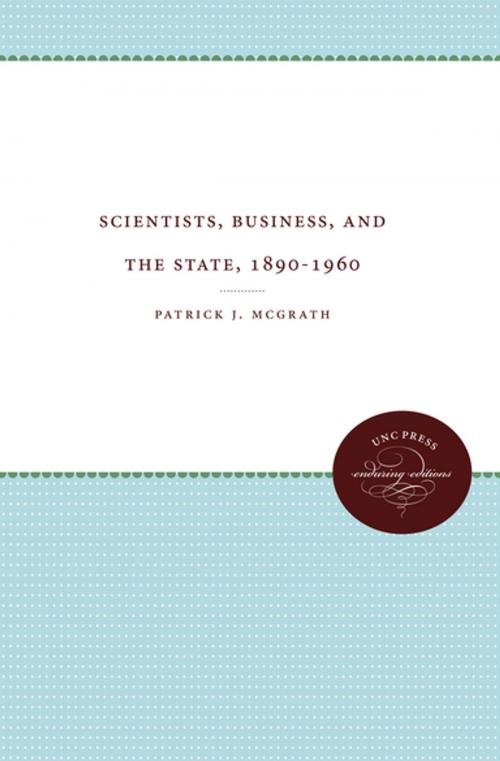Scientists, Business, and the State, 1890-1960
Business & Finance, Business Reference, Government & Business, Nonfiction, Science & Nature, Science, Other Sciences, History, Americas, United States, 20th Century| Author: | Patrick J. McGrath | ISBN: | 9780807875285 |
| Publisher: | The University of North Carolina Press | Publication: | January 14, 2003 |
| Imprint: | The University of North Carolina Press | Language: | English |
| Author: | Patrick J. McGrath |
| ISBN: | 9780807875285 |
| Publisher: | The University of North Carolina Press |
| Publication: | January 14, 2003 |
| Imprint: | The University of North Carolina Press |
| Language: | English |
In the late nineteenth century, scientists began allying themselves with America's corporate, political, and military elites. They did so not just to improve their professional standing and win more money for research, says Patrick McGrath, but for political reasons as well. They wanted to use their new institutional connections to effect a transformation of American political culture. They succeeded, but not in ways that all scientists envisioned or agreed upon.
McGrath describes how, between 1890 and 1960, scientific, business, and political leaders together forged a new definition of American democracy in which science and technology were presented to the public as crucial ingredients of the nation's progress, prosperity, and political stability. But as scientists became more prominent, they provoked conflicts among themselves as well as with their institutional patrons over exactly how their expertise should be used. McGrath examines the bitter battles that erupted over the role scientists should play during the Great Depression, World War II, the Cold War arms race, and the security and loyalty investigations of the 1950s. He finds that, by the end of the 1950s, scientists were regarded by the political and military elite not as partners but as subordinate technicians who were expected to supply weapons on demand for the Cold War state.
Originally published 2001.
A UNC Press Enduring Edition -- UNC Press Enduring Editions use the latest in digital technology to make available again books from our distinguished backlist that were previously out of print. These editions are published unaltered from the original, and are presented in affordable paperback formats, bringing readers both historical and cultural value.
In the late nineteenth century, scientists began allying themselves with America's corporate, political, and military elites. They did so not just to improve their professional standing and win more money for research, says Patrick McGrath, but for political reasons as well. They wanted to use their new institutional connections to effect a transformation of American political culture. They succeeded, but not in ways that all scientists envisioned or agreed upon.
McGrath describes how, between 1890 and 1960, scientific, business, and political leaders together forged a new definition of American democracy in which science and technology were presented to the public as crucial ingredients of the nation's progress, prosperity, and political stability. But as scientists became more prominent, they provoked conflicts among themselves as well as with their institutional patrons over exactly how their expertise should be used. McGrath examines the bitter battles that erupted over the role scientists should play during the Great Depression, World War II, the Cold War arms race, and the security and loyalty investigations of the 1950s. He finds that, by the end of the 1950s, scientists were regarded by the political and military elite not as partners but as subordinate technicians who were expected to supply weapons on demand for the Cold War state.
Originally published 2001.
A UNC Press Enduring Edition -- UNC Press Enduring Editions use the latest in digital technology to make available again books from our distinguished backlist that were previously out of print. These editions are published unaltered from the original, and are presented in affordable paperback formats, bringing readers both historical and cultural value.















